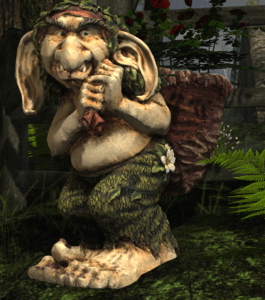
Photo courtesy of Rissa’s Second Life
What’s a Troll?’
First off: lets lay down some terms, because ‘troll’ is not well defined. For our purposes, trolling is a constellation of three social practices: learning, assimilating, and transgressing in order to co-opt a discussion. There’s actually been scholarly research on it, and while I’m focusing on the anti-social effects it can have in a Second Life group, there is some research that says it can (at times) have a pro-social impact on online communities.
The first group I observed told me about the two-part nature of one trolls interaction – and it involved an (perhaps unwitting) ally, or ‘attractor’.
If you witness the attractor’s interaction with a troll, it is evident that their reaction will cause the troll to escalate their vexing behavior in an effort to get under the attractors skin. Both parties enter a vicious cycle, this one ending with the attractor exiting the sim for good. But even that didn’t end the drama.
“They hate us when we’re there, hate us when we’re gone,” they said, in an open conversation about how chatter-boxes in the original sim were still talking about their leaving – and how it left a poor taste in their mouths.
“Telephone: the Game”

Photo courtesy of AsteroidBox (visit their marketplace store).
Unfortunately, in SL, it is easy for conversations between friends to be conferred through a number of people to the point of badly distorting the message, or just taking it out of context. That leaves one friend offended and the other in utter confusion about what happened. If these words do not go directly from messenger to receiver, it is possible that an affectionate remark will get turned into an end of friendship because of the “he said, she said” that is sandwiched in between.
One person informed me that they would rather include everyone who would like to join in and no one be excluded. A 12 year SL resident I call “Mr. M” says SL users, as a general population, have real life social hang ups and they “bring those problems here.”
“I have defended people. Often, actually. I have had my character attacked,” said another SLitizen who has been in-world since 2008, and who requested anonymity so as to not cause turmoil in their active groups. “All you can do is be yourself if people lie. If criticism has merit, I consider it. People are often not brave enough to be open about it.”
The way this SLitizen puts it: group discord can come from “Miscommunication, when people are trying to be kind” and “Power struggles when people aren’t trying to be kind.”
Noobs BEWARE!
In another form of “flattery”- and I use that word in quotes because there is nothing in these scenarios that makes anyone feel good – you sometimes encounter other types of interactions that are not only nuisances, but tend to create discomfort if uninvited.
When a noob logs in the first few times, they frequently find fun people with whom they can kick back and chat or voice. Unaware that they are letting down much needed guards and opening the door for ANYONE to be a friend.
“It’s like when I warned you about giving out even a little info about your offline life to just anyone,” said one anonymous SLitizen. “People with nefarious motives will keep notes on those things, and over time may be able to gather a lot of info. We tend to think of being online as short time (unless you’re one who is really here 24/7 and that’s a whole nuttha story.)”
Linden Labs provides a section on your profile for other people to keep notes on you. You don’t get to see these notes, only they do. And people in SL will keep notes on you.
These notes could be taken by someone who is worried about a newcomer that is showing troll-like tendencies — or potentially a more malevolent maneuver. In a preemptive move to avoid the latter from happening, some will often find a different sim to make friends. Making some note taking useful, particularly when it comes to deciding on a necessary move away from the original group.
Aside from being put off by trolls and stalkers, the more obvious divisions come from discussions of politics and religion. This is the RL bleed into SL that people cannot seem to relinquish. People here will often have active sexual second lives while at the same time clinging to their political and religious beliefs without skipping a beat.
“The SL climate has changed over time. People treat it more like a game than the virtual world it was intended…also more Millennial’s,” said long-time Slitizen Stella Saxmundham. “Gen X, Y, Z, and the greatest generation – the Boomers – are here! We don’t often agree. Each generation thinks theirs invented the wheel.”
The Real Reason
After interviewing these long time users, I have a better understanding of how words do actually have meaning and effect. Frequently, the emotional aspect of our real life selves play into our reactions. It is easy to detach because in reality it is you sitting alone in front of a screen as it quickly fills with thoughts from other people doing the same thing. You can smoothly transition into actual feelings about a nonexistent place without consequence. Or can you? No one is actually yelling in your face, maybe in your ear, and they are not physically harming you, but the visceral response is often real.
“The first experience was the most painful because I didn’t expect those real-life emotions to spill over into Second Life,” again from Stella, “Later, I became more accustomed to the dynamics of these heated, often impassioned arguments.”
~Gina
Up Next:
In the last installment I look at the up-side of groups








Recent Comments